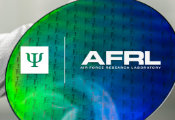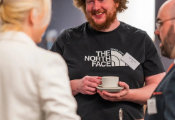NWO Summit Grant to Investigate Fundamental Quantum Limits
NWO Summit Grant to Investigate Fundamental Quantum Limits
A research consortium from TU Delft and Leiden University receives an NWO Summit Grant of 35 million euros, as a long-term support and to continue their prominent role internationally. They aim to investigate the fundamental limits of quantum physics. In total five consortia from different Dutch universities will receive a total of 188 million euros to strengthen the position of Dutch science.
Helping Qubits Stay in Sync
Helping Qubits Stay in Sync
As part of the Center for Quantum Leaps, a signature initiative of the Arts & Sciences strategic plan, physicist Kater Murch and his research group use nano-fabrication techniques to construct superconducting quantum circuits that allow them to probe fundamental questions in quantum mechanics. Qubits are promising systems for realizing quantum schemes for computation, simulation and data encryption.
New Crystal Production Method Could Enhance Quantum Computers and Electronics
New Crystal Production Method Could Enhance Quantum Computers and Electronics
In a study published in Nature Materials, scientists from the University of California, Irvine describe a new method to make very thin crystals of the element bismuth – a process that may make the manufacturing of cheap flexible electronics an everyday reality.
International Research Team Cracks a Hard Physics Problem
International Research Team Cracks a Hard Physics Problem
Strongly interacting systems play an important role in quantum physics and quantum chemistry. Stochastic methods such as Monte Carlo simulations are a proven method for investigating such systems. However, these methods reach their limits when so-called sign oscillations occur. This problem has now been solved by an international team of researchers from Germany, Turkey, the USA, China, South Korea and France using the new method of wavefunction matching. As an example, the masses and radii of all nuclei up to mass number 50 were calculated using this method. The results agree with the measurements, the researchers now report in the journal “Nature”.
Physicists Create Five-Lane Superhighway for Electrons
Physicists Create Five-Lane Superhighway for Electrons
MIT physicists and colleagues have created a five-lane superhighway for electrons that could allow ultra-efficient electronics and more. The work, reported in the May 9 issue of Science, is one of several important discoveries by the same team over the last year involving a material that is essentially a unique form of pencil lead.
Quantum Breakthrough Sheds Light on Perplexing High-Temperature Superconductors
Quantum Breakthrough Sheds Light on Perplexing High-Temperature Superconductors
Using the Hubbard model, Flatiron Institute senior research scientist Shiwei Zhang and his colleagues have computationally re-created key features of the superconductivity in materials called cuprates that have puzzled scientists for decades.
The Interference of Many Atoms, and a New Approach to Boson Sampling
The Interference of Many Atoms, and a New Approach to Boson Sampling
Now, in a recently published Nature paper, JILA Fellow and NIST Physicist and University of Colorado Boulder Physics Professor Adam Kaufman and his team, along with collaborators at NIST (the National Institute of Standards and Technology), have demonstrated a novel method of boson sampling using ultracold atoms (specifically, bosonic atoms) in a two-dimensional optical lattice of intersecting laser beams.
What If Metals Could Conduct Light?
What If Metals Could Conduct Light?
ow scientists have discovered that in the quantum metal ZrSiSe, electrons show exotic behaviors because their quantum mechanical nature manifests more readily than in common metals. With these exotic behaviors, electrons can give rise to what scientists call plasmons. These are collective oscillations in a material that are strong and long lived.
Revealing the Quantumness of Gravity
Revealing the Quantumness of Gravity
Proposed experiment shows that quantum entanglement is not the only way to test whether gravity has a quantum nature.
HQS Introduces HQStage, a Modular Quantum Simulation and Quantum Computing Toolkit
HQS Introduces HQStage, a Modular Quantum Simulation and Quantum Computing Toolkit
HQS Quantum Simulations, a leading provider of quantum simulation software, proudly presents HQStage, a powerful modular cloud-supported toolkit designed to meet the simulation needs of developers and researchers in quantum physics and chemistry. HQStage offers 10 powerful simulation modules, intuitive management tools and the flexibility to combine local and cloud computing.


























